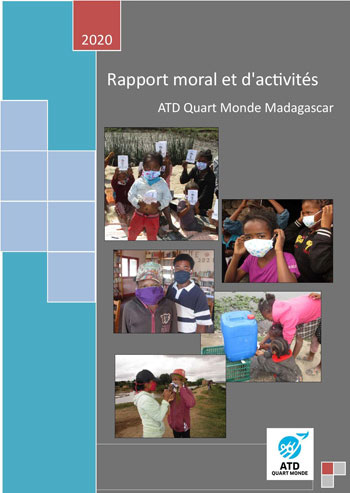Working with Families in Extreme Poverty

Above: Cover of ATD Fourth World Madagascar’s 2020 annual report.
ATD’s work in Madagascar focuses on four main areas: supporting 24 priority families, hosting group activities, community outreach, and supporting others working to overcome extreme poverty.
24 priority families
With priority families, ATD’s first goal is to help them see significant change taking place in their lives. This better positions families to regain control of their future. The second goal is to demonstrate to others that significant change is possible for those living in extreme poverty. This nurtures advocacy for more inclusive policies that create independence.
What does this mean exactly? It means that ATD supports and responds to the deep longing for change that families already have. ATD’s work clearly demonstrates that with appropriate resources, even the lives of families facing enormous obstacles do change for the better. Extreme poverty in not an inevitable fate that condemns certain families to a life of hardship.
Regular family visits
Supporting priority families first requires building a trusting relationship. Only then will families express what they want and how they plan to achieve it. ATD creates trust through visiting families regularly. Eventually, such meetings bring to light not only daily difficulties, but also plans for tomorrow.
ATD staff visit families in pairs in order to build broader relationships. In addition, it allows for two perspectives on the visit, which results in a better understanding of the family situation. Visiting in pairs also means that no one person has the responsibility of making difficult decisions on their own.
Following visits, the full team discusses what happened so that everyone has the full picture of what a family is experiencing.
Support for children and teenagers
Children and teenagers of priority families are often not enrolled in school. So ATD helps young family members understand the education options available to them. When possible, ATD staff help young people find and register for appropriate training or an internship. After someone has completed training, ATD staff help with job placement.
Equally important, however, ATD team members talk with children and teenagers about their dreams. Together they develop a plan for the future and for how to achieve goals. Such conversations help expand horizons by looking at options that go beyond expected norms in the community. They help children and teenagers see that they do not have to follow in any one els’s footsteps. For them, a different future in which they escape poverty really is possible.
Lack of birth certificate
Not having a birth certificate can be a big problem. In Madagascar, there are many reasons people experiencing poverty might not have one. Some births are not reported because people don’t understand the process for doing so. Others are afraid to make the request or lack a marriage certificate. Sometimes families can’t afford the fee for a birth certificate. Or, in the struggle to survive, getting the paperwork done is simply not possible. In addition, replacing a lost birth certificate can require information that a family no longer has.
The problems of not having a birth certificate are significant. Without one, children have trouble enrolling in school, taking exams or getting a national identity card. Therefore, two members of ATD’s staff help priority families through the process of getting the certificate, which can be time consuming and expensive.
Right to decent housing
Most priority families have insecure housing. Because land ownership is sometimes ambiguous, it is hard for families to establish or maintain permanent housing, much less plan for the future. So ATD two staff members help families create a budget, plan repair projects, and start saving.
When priority families have no extended family support, ATD helps organise a ‘solidarity work camp’, gathering neighbours or religious community members to help the family rebuild a collapsed wall or crumbling roof.
Access to healthcare
Many families simply can not afford health care. But other things get in the way too:
- Some people don’t know that everyone has the right to be healthy or believe that care costs more than it does
- There is often fear of criticism from medical providers
- In the struggle for basic survival, sometimes health takes a back seat to more pressing needs
The ATD team first seeks to help families find their way back to health. Part of this involves encouraging families to visit medical providers if they are reluctant to do so. If necessary, ATD accompanies families to their first medical visit.
Currently, the ATD team is establishing partnerships with community care centres where ATD can pay for the health care of priority families. The goal is always for families to establish financial independence so they can pay for their own healthcare.
Developing income generating activities
ATD helps families stabilise and increase income and diversify resources in a number of ways. Mothers are encouraged to join MMM, a professional training and personal development project. For other family members, ATD staff help develop or improve employment or plans to find work. Staff support families in budgeting so that a family’s expenses do not exceed their income and saving becomes possible.
If family members are interested, ATD can connect them with local community projects.
More about ATD Fourth World Madagascar
ATD Fourth World Madagascar on facebook
Article adapted from ATD Fourth World Madagascar’s 2020 annual report.

